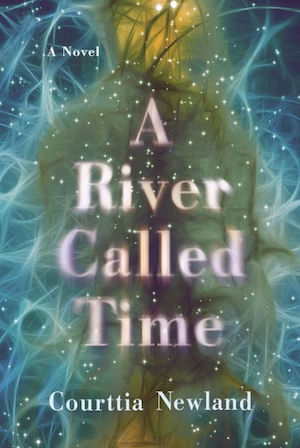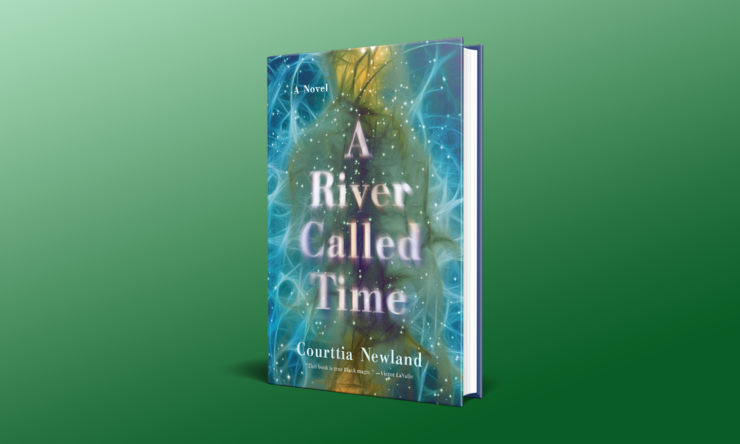If the novel’s composition matched the author’s conception, Courttia Newland’s A River Called Time would constitute a major accomplishment in speculative fiction. Newland creates a radically different Earth, devises a complex world-beyond-the-world of astral projection, and then, in the novel’s second half, sends his overwhelmed protagonist on an odyssey into further worlds.
What might our world look like if humanity were innocent of some of its foundational crimes? A River Called Time begins and ends in a world “in which the Transatlantic Slave Trade, colonization, and the genocide known as Maafa (great tragedy, awful event) hadn’t ever taken place” and that is therefore liberated from “the race-fixated, identity-based reality we live every day.” Newland provides a timeline at the beginning of the book; there are broad parallels to real-world history, but the world moves more quickly, so that a beneficent Christopher Columbus sails in 1392 and Henry VIII establishes the “Anglican Kemitic Temple” a full century before our world’s Henry broke from Rome. The “War of Light” of 1814-1818 replaces our world’s Great War; atomic-adjacent weapons kill millions.
The inhabitants of Newland’s alternate London, Dinium, bear neither the guilt nor the scars of racism and colonialism, but their world is no utopia. A devastating explosion destroyed the heart of the city a century ago; at the center of the wasteland stands a vast pyramid, the Ark, which houses the city’s elite. Only the most talented or most fortunate are allowed into the artificially lit halls of the building, and no one admitted to the Ark ever returns to the outside world.
By dint of hard work and natural intelligence, Newland’s hero, Markriss, makes his way out of one of Dinium’s seediest neighborhoods and into the Ark. He doesn’t find the paradise he expected; the Ark is a rigidly segregated society, and Markriss spends his days writing propaganda “journalism” for the Ark’s unseen leaders. As a child and teenager, Markriss had endured inexplicable and terrifying out-of-body experiences; he turns out to have a once-in-millennia gift for astral projection. Guided by a long-dead scientist whose inventions shaped Markriss’s world and whose sordid death remains a mystery, Markriss must navigate alternate lives and parallel realities to avert a world-ending calamity.
Buy the Book


A River Called Time
Authors like Nisi Shawl in Everfair and P. Djèlí Clark in the Cairo series have imagined better, or at least different, worlds where racism and colonialism were less endemic or less influential, and I wondered if A River Called Time might stand with those titles. Newland has published several previous novels and was a writer for Steve McQueen’s acclaimed Small Axe, and so I had high hopes.
I have rarely been so disappointed with a novel. Although A River Called Time abounds in invention and has been scrupulously researched, consistently awful prose yields an almost unreadable book.
Here’s a representative sentence from a random page: “An outpouring of emotion and injustice grew hot inside him until he forced it to recede.” What emotion or emotions are intended here? How does “injustice” outpour from someone? What does it mean for this “injustice” to be “inside him”? And does this vague feeling really constitute an “outpouring” if it remains “inside” and is made to “recede”? Later on the same page, we read that “Markriss stared at the old man’s sagging face, his infinite strop angled towards rocks.” What is an “infinite strop”? The dictionary tells us that a “strop” is “a device, typically a strip of leather, for sharpening straight razors.” In colloquial British English, “strop” may be “a bad mood; a temper.” Neither definition gives much clue to what’s intended.
Throughout, the prose is littered with redundancies (“The forest of trees grew thin”) and malapropisms, as when a minor character is described as “a carpenter by assignation.” I imagined him bearing saw, two-by-fours, and nails to a moonlit rendezvous. Sentences crawl and meander through long chains of superfluous detail and comma-linked participle phrases: “Markriss’s hearing returned just as his neck craned around as far as muscles allowed, when more hands pulled him in another direction, up metal steps and onto a bridge that took them over the heads of the crowd, onto the station platform.” Whatever momentum plot or characters or action might achieve, the writing immediately halts.
A River Called Time runs 450 pages and feels longer. For every memorable piece of worldbuilding, for every mystery introduced and every enigma explained, there are dozens or hundreds of ugly or incoherent sentences. If you can see past the words to the ideas beyond—in short, if you practice literary astral projection—you might enjoy the plunge into A River Called Time. Those of us not so gifted should remain ashore.
A River Called Time is available from Akashic Books.
Read an excerpt here.
Matt Keeley reads too much and watches too many movies. You can find him on Twitter at @mattkeeley.










